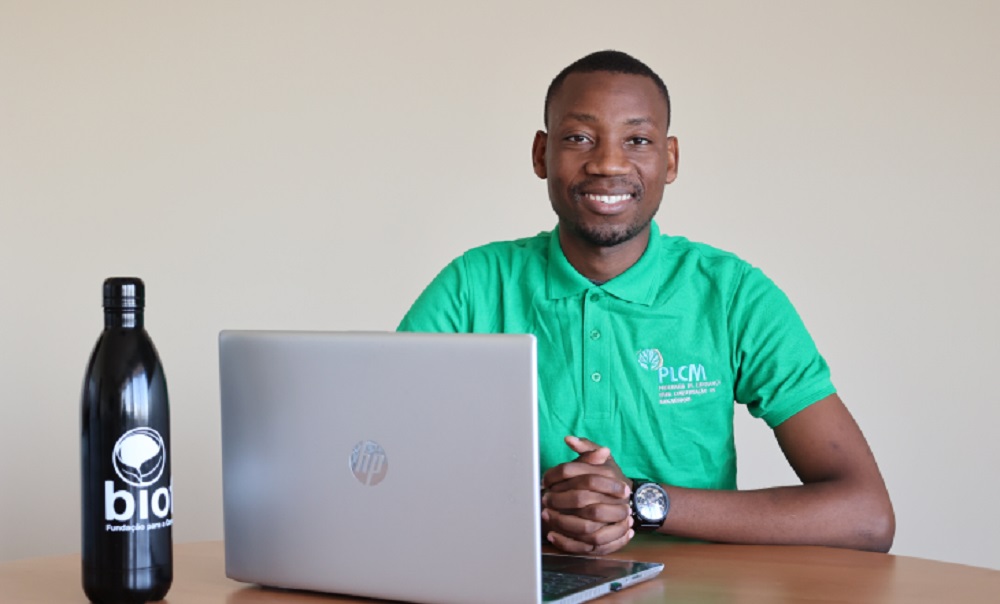
PLCM is part of MozBio2 one of more than 15 projects of the Foundation, which started in 2019 with funding from the World Bank. With this opportunity, I was part of BIOFUND’s M&E team, with whom we developed and implemented monitoring tools for over 30 Foundation’s Beneficiary Conservation Areas, and strengthened the technical capacity for a systematic monitoring of the activities financed.
I vividly remember the day of my first contact with the program to this date.
« What is your goal in this internship ? »
This is the question that was asked to me and 11 other young people in March 2020, during the « group dynamics » on the day of induction to the program. We were confused and anxious. And I didn’t have the answer, but I knew that words like learn, contribute, share or networking should all be part of it.
It’s amazing how, in movies, people always know exactly what they want to be and choose precisely what to do. In fact, many of us have learned to answer these questions with time, exposure, and learning. I think I am still setting my answer and the recent opportunity to participate in the First Congress of the International Union for Conservation of Nature (IUCN) on the Protected Areas of Africa (APAC), held in Kigali, Rwanda, played an important role in this process. And other than having an answer, it made me want to ask more questions.
As a conservationist, I was amazed with the place of the event – Rwanda must be an example of conservation – the attitude of Rwandans towards the environment is amazing, it makes one think of the concept of Environmental Protection Areas and Biosphere Reserve, both for the rigorous cleanliness and the level of forestation in its capital, Kigali.
And the 30.4% of the national territory declared as a Protected Area does not match to everything that is actually done as there are numerous conservation and pro-environmental actions outside the Areas designated for this purpose.
As much as I could write, I prefer to limit myself to the two main lessons of my experience in APAC, Rwanda: first, and by the way, this was one of the main themes for reflection at the Congress, is Management Effectiveness (in Protected Areas), — those who visit this country must bear witness to its effectiveness and efficiency, but I think that those who are interested in environmental areas are even more impacted by the results that this small African country has achieved in « environmental awareness and education ».
Yes, it is possible not to accumulate garbage outside the designated places! Yes, it is possible not to use plastic bags! Yes, it is possible not to deliberately throw trash out of car windows, and the list goes on. Perhaps we could rethink even more on the effectiveness of the campaigns we carry out for the environment, the regulations we submit to, the numbers, tables and graphs we report, we should ask ourselves: do we actually have Conservation Areas, or just simply polygons on maps and « parks in the CAs’ list of categories » ?.
The second great lesson I learned from that is the Sense of Belonging. Being part of 2,400 participants from 80 countries, with a large active representation of young people, and being with Mozambicans who have actively contributed to the conservation of biodiversity in my country challenged me to think that we, the young people of Mozambique, also have a big role to play in this process.
We can generate real impact and achieve the effectiveness we crave, but that involves assuming that we are part of the conservation community, and that we can. And accept that only we, the young people, will be the future responsible for the continuity of the actions that are being developed to keep biodiversity in the present.
Let’s face the reality: conservation has not been the most attractive area of work for young people to pursue, comparing it, for example, with professions that our society still values differently, such as medicine, law, engineering or education. But fortunately, in recent years, conservation issues have been gaining more and more media visibility and social weight.
Although it does not ensure that those who follow it will have the promises of comfort or the conventional routine that one obtains in other professions, conservation has nevertheless attracted a whole new generation of young people, like me, to what, other than a profession, it is a Mission for which we are ready and do not expect rewards in the form of comforts or « amenities ».
My permanent anxiety is to be able to integrate my small contribution to conservation in a broader and even more important context, to find the answer to that question asked in 2020. Today I know that it is not necessary to be an expert in fauna, flora or ecosystems. I know that anyone of us can somehow be part of the change, and that we all can and must contribute to the conservation of biodiversity. If we, young people are the future, we need to take care of biodiversity and start today.
Subscribe to view notification of our daily news
RwandaPodium © All Rights Reserved. Powered by thesublime.rw